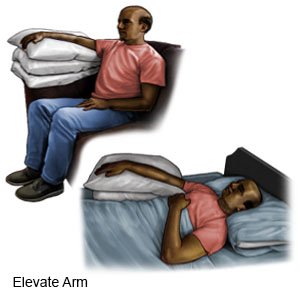Flash Burn of Skin
Medically reviewed by Drugs.com. Last updated on Jun 30, 2025.
AMBULATORY CARE:
A flash burn
is caused by an explosion of natural gas, propane, gasoline, or other flammable liquid. Any unprotected part of your skin that is exposed to the explosion can get burned. The severity of your burn depends on how long your skin was exposed to heat from the explosion. The burn can be a first degree or second degree burn.
Signs and symptoms of a first degree flash burn:
A first degree burn is a burn of the first (outer) layer of your skin. A first degree burn heals within 3 to 7 days. You may have any of the following:
- Red, dry, tender skin
- Swelling
- Skin that turns white when touched
- Skin that is painful to the touch
Signs and symptoms of a second degree flash burn:
A second degree burn is also called a partial thickness burn. This type of burn occurs when the first layer and some of the second layer of your skin are burned. The deeper layers of your skin, sweat glands, and oil glands are not damaged. A superficial second degree burn heals within 7 to 21 days. You may have any of the following:
- Blisters and peeling skin
- Skin that turns white when touched
- Red, moist skin
- Skin that is very painful to the touch
Seek care immediately if:
- You have severe pain, even after you take pain medicine.
- You have a fast heartbeat or breathing.
- You are urinating very little or not at all.
Call your doctor or burn specialist if:
- You have a fever.
- Your urine is dark brown or tea colored.
- You have increased redness, numbness, or swelling in the burn area.
- Your wound or bandage is leaking pus and has a bad smell.
- You have signs of dehydration such as increased thirst, dark yellow urine, or dry mouth or eyes.
- You have questions or concerns about your condition or care.
Treatment for a flash burn
depends on the type of burn you have. You may need any of the following:
- The burn may be cooled with water or moist gauze. This will help relieve pain and decrease swelling. This can also help to limit tissue damage caused by the burn.
- The burn may be cleaned with a cleanser or gauze. Damaged tissue may also be removed.
- A cream or ointment helps to decrease pain or prevent infection. The burn will be covered with a bandage. The ointment may be placed on your skin or may be part of your bandage.
- Prescription pain medicine may be given. Ask your healthcare provider how to take this medicine safely. Some prescription pain medicines contain acetaminophen. Do not take other medicines that contain acetaminophen without talking to your healthcare provider. Too much acetaminophen may cause liver damage. Prescription pain medicine may cause constipation. Ask your healthcare provider how to prevent or treat constipation.
- Physical therapy may be recommended if the skin over a joint is burned . A physical therapist teaches you exercises to help improve movement and strength, and to decrease pain.
Burn care:
You may need to change your bandages at least 1 time each day at home. Follow your healthcare provider's instructions for caring for your burn. He or she may recommend the following:
- Wash your hands with soap and water. Dry your hands with a clean towel or paper towel.

- Remove old bandages. You may need to soak the bandage in water before you remove it so it will not stick to your wound.
- Gently clean the burned area daily with water. Pat the area dry. Look for any swelling or redness around the burn. Do not break closed blisters because this increases the risk for infection. If a blister breaks, clean the area as you would the rest of the burn.
- Apply cream or ointment to the burn with a cotton swab. Place a nonstick bandage over your burn.
- Wrap a layer of gauze around the bandage to hold it in place. The wrap should be snug but not tight. Make sure you can insert 1 to 2 fingers between the bandage and your skin. It is too tight if you feel tingling or lose feeling in that area. Apply gentle pressure for a few minutes if bleeding occurs.
- Elevate your burned arm or leg above the level of your heart as often as you can. This will help decrease swelling and pain. Prop your arm or leg on pillows or blankets to keep it elevated comfortably.

Follow up with your doctor or burn specialist as directed:
You may need to return to have your burn checked again. You may also need to have the burn cleaned and the bandages changed. Write down your questions so you remember to ask them during your visits.
© Copyright Merative 2025 Information is for End User's use only and may not be sold, redistributed or otherwise used for commercial purposes.
The above information is an educational aid only. It is not intended as medical advice for individual conditions or treatments. Talk to your doctor, nurse or pharmacist before following any medical regimen to see if it is safe and effective for you.
Further information
Always consult your healthcare provider to ensure the information displayed on this page applies to your personal circumstances.
